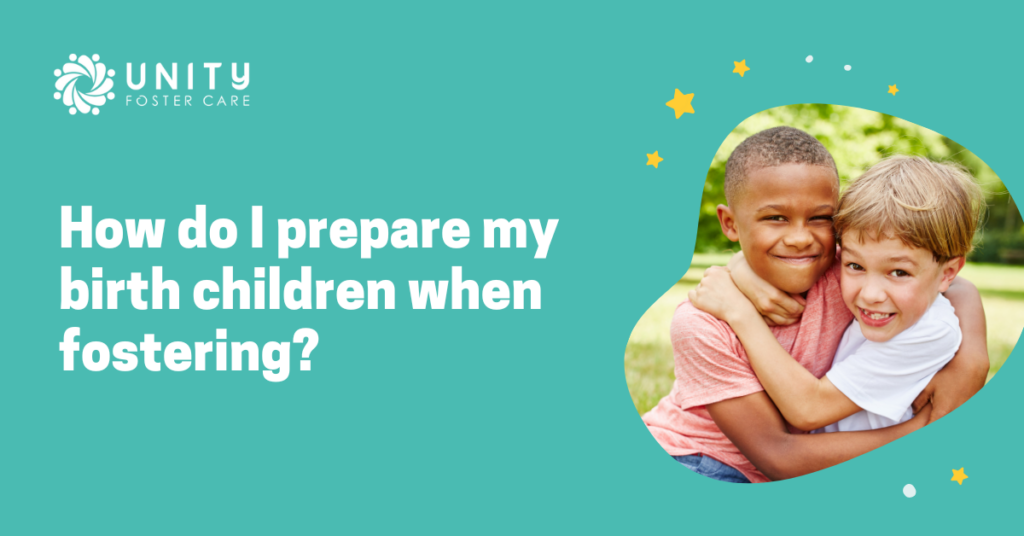How can I prepare my birth children when fostering?

Becoming a foster carer is a decision that should involve the whole family. If you have birth children, it’s important to include them in the fostering journey, so that they feel part of the decision and prepared for this new transition.
You may have concerns about how fostering might impact your birth children. Possible challenges may include disruption to their routine, learning to share belongings and their parents’ time, and observing difficult behaviour from the child being fostered. Whilst this may cause some worry, it’s important to remember that belonging to a foster family can also have many positive effects on birth children, from developing empathy and social skills to building new relationships.
Many of our foster families have positive experiences to share, with many birth children quickly becoming firm friends with the children they welcome into their new foster family.
In this blog post, we’ll guide you through some of the steps you can take to help your birth children understand and prepare for this exciting new chapter.
Explain what fostering is (and isn’t)
Even if your birth children are familiar with fostering, there will be things they don’t know. Have an open conversation about what fostering involves, and the positive difference your family can make to a foster child’s life.
There can sometimes be confusion between fostering and adoption, so take this opportunity to clarify the similarities and differences. Explain that while both provide love and stability to vulnerable children, fostering can be a temporary commitment.
It’s important your birth children understand that foster children may be reunited with their biological families when the time is right. When this happens, birth children may experience feelings of sadness or loss. It’s important to create an open environment where birth children can express their feelings, ask questions, and find comfort in the fact that they have provided love and stability to a child in need. Celebrating the moments shared and acknowledging the positive impact birth children have made can be empowering, helping them to appreciate the importance of helping others, even when it comes with the challenge of saying goodbye.
If you feel comfortable, you might want to discuss why some young people end up in foster care and the circumstances that prevent them from being looked after by their biological parents.
Encourage open communication
Remember to keep checking in with your birth children throughout your fostering journey as new questions and emotions come up, from excitement to apprehension. Listening to their concerns is validating and will reassure them that your love for them remains unchanged and that they will always be a priority.
You might not always have the answers your children are searching for. They may want to know who will be staying with you and for how long. Talk to them about the matching process and the distinctions between long-term and short-term placements to ensure they feel included in the fostering journey.
If your family has questions you don’t have immediate answers to, just be honest and explain certain details are still being figured out. If you’re ever unsure, your dedicated social worker is on hand 24/7 to offer guidance through these conversations.
Prepare your birth children for change
Becoming a foster carer may change your family dynamics. To make it a smooth transition, it’s important to discuss and plan for these changes together.
You could ask which belongings they feel comfortable sharing, talk through any adjustments to their routines and prepare them for challenges the foster child might have experienced. Remind them that foster children sometimes have different upbringings that might influence their behaviour, and encourage them to keep an open mind.
Give your birth children an active role to play
Involving your birth children in preparing your foster child’s bedroom, planning an outing or choosing what meal to have on your first night together are great ways to build excitement around welcoming your foster child into the family.
Birth children can also play a vital role in providing peer support. Whether it’s helping with settling into a new school, showing them around the area, introducing them to friends, or including them in games, encourage your birth child to welcome the child you’re fostering into the family.
Are you considering fostering in the North East?
More than half of looked-after children in England are in care due to abuse or neglect.* But you could make a difference, by providing a much-needed loving home.
Could you help to transform the lives of children and young people in your area? If you’re based in Leeds, Yorkshire or nearby areas in the North East and are considering fostering, we’re here to support you.
Our friendly advisor, Gemma, is on hand to answer any questions you have and will guide you through the fostering journey. To book an informal chat, select a date and time that works for you and we’ll be in touch. Alternatively, you can call us directly on 0333 77 22 333.
*NSPCC/ DfE, 2022
